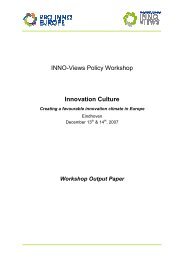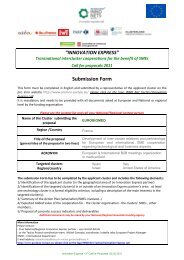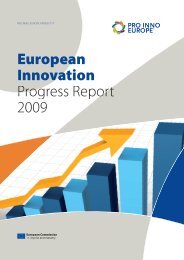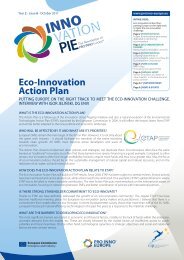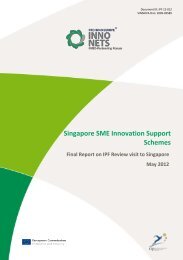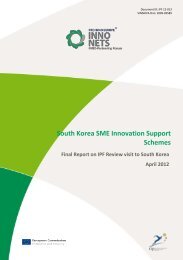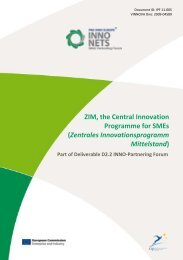- Page 1:
PRO INNO Europe paper N° 4 BENCHMA
- Page 4 and 5:
PRO INNO Europe The innovation poli
- Page 7 and 8:
Contents Executive Summary 9 1 Intr
- Page 9 and 10:
4. Case Study: Innovation by patent
- Page 11 and 12:
Executive Summary Background 1. The
- Page 13 and 14:
under all circumstances), but rathe
- Page 15 and 16:
overall policy level, which primari
- Page 17 and 18:
the fact that the business perspect
- Page 19:
and evaluation). Hence, there is a
- Page 22 and 23:
20 BENCHMARKING NATIONAL AND REGION
- Page 24 and 25:
22 BENCHMARKING NATIONAL AND REGION
- Page 27 and 28:
3 SMEs in the IPR world 3.1 SMEs an
- Page 29 and 30:
amount of time (mostly up to 20 yea
- Page 31 and 32:
In contrast to arrangements for pat
- Page 33 and 34:
3.3 Usage Patterns of IP protection
- Page 35 and 36:
industries of the ICT sector. These
- Page 37 and 38:
In a study conducted by Kingston (K
- Page 39 and 40:
Care must be taken that statements
- Page 41 and 42:
The first step to ensure that IP ma
- Page 43:
The patent troll as an SME-affine e
- Page 46 and 47:
44 BENCHMARKING NATIONAL AND REGION
- Page 48 and 49:
46 BENCHMARKING NATIONAL AND REGION
- Page 50 and 51:
48 BENCHMARKING NATIONAL AND REGION
- Page 52 and 53:
50 BENCHMARKING NATIONAL AND REGION
- Page 54 and 55:
52 BENCHMARKING NATIONAL AND REGION
- Page 56 and 57:
54 BENCHMARKING NATIONAL AND REGION
- Page 58 and 59:
56 BENCHMARKING NATIONAL AND REGION
- Page 60 and 61:
58 BENCHMARKING NATIONAL AND REGION
- Page 62 and 63:
60 BENCHMARKING NATIONAL AND REGION
- Page 64 and 65:
62 BENCHMARKING NATIONAL AND REGION
- Page 66 and 67:
64 BENCHMARKING NATIONAL AND REGION
- Page 68 and 69:
66 BENCHMARKING NATIONAL AND REGION
- Page 70 and 71:
68 BENCHMARKING NATIONAL AND REGION
- Page 72 and 73:
70 BENCHMARKING NATIONAL AND REGION
- Page 74 and 75:
72 BENCHMARKING NATIONAL AND REGION
- Page 76 and 77:
74 BENCHMARKING NATIONAL AND REGION
- Page 78 and 79:
76 BENCHMARKING NATIONAL AND REGION
- Page 80 and 81:
78 BENCHMARKING NATIONAL AND REGION
- Page 82 and 83:
80 BENCHMARKING NATIONAL AND REGION
- Page 84 and 85:
82 BENCHMARKING NATIONAL AND REGION
- Page 86 and 87:
84 BENCHMARKING NATIONAL AND REGION
- Page 88 and 89:
86 BENCHMARKING NATIONAL AND REGION
- Page 90 and 91:
88 BENCHMARKING NATIONAL AND REGION
- Page 92 and 93:
90 BENCHMARKING NATIONAL AND REGION
- Page 94 and 95:
92 BENCHMARKING NATIONAL AND REGION
- Page 96 and 97:
94 BENCHMARKING NATIONAL AND REGION
- Page 98 and 99:
96 BENCHMARKING NATIONAL AND REGION
- Page 100 and 101:
98 BENCHMARKING NATIONAL AND REGION
- Page 102 and 103:
100 BENCHMARKING NATIONAL AND REGIO
- Page 104 and 105:
102 BENCHMARKING NATIONAL AND REGIO
- Page 106 and 107:
104 BENCHMARKING NATIONAL AND REGIO
- Page 108 and 109:
106 BENCHMARKING NATIONAL AND REGIO
- Page 110 and 111:
108 BENCHMARKING NATIONAL AND REGIO
- Page 113 and 114:
7. References Abbot, A. (2006): Pat
- Page 115 and 116:
http://www.european-inventor.org/pd
- Page 117:
ANNEX I - CASE STUDIES The case stu
- Page 120 and 121:
118 BENCHMARKING NATIONAL AND REGIO
- Page 122 and 123:
120 BENCHMARKING NATIONAL AND REGIO
- Page 124 and 125:
122 BENCHMARKING NATIONAL AND REGIO
- Page 126 and 127:
124 BENCHMARKING NATIONAL AND REGIO
- Page 128 and 129:
126 BENCHMARKING NATIONAL AND REGIO
- Page 130 and 131:
128 BENCHMARKING NATIONAL AND REGIO
- Page 132 and 133:
130 BENCHMARKING NATIONAL AND REGIO
- Page 134 and 135:
132 BENCHMARKING NATIONAL AND REGIO
- Page 136 and 137:
134 BENCHMARKING NATIONAL AND REGIO
- Page 138 and 139:
136 BENCHMARKING NATIONAL AND REGIO
- Page 140 and 141:
138 BENCHMARKING NATIONAL AND REGIO
- Page 142 and 143:
140 BENCHMARKING NATIONAL AND REGIO
- Page 144 and 145:
142 BENCHMARKING NATIONAL AND REGIO
- Page 146 and 147:
144 BENCHMARKING NATIONAL AND REGIO
- Page 148 and 149:
146 BENCHMARKING NATIONAL AND REGIO
- Page 150 and 151:
148 BENCHMARKING NATIONAL AND REGIO
- Page 152 and 153:
150 BENCHMARKING NATIONAL AND REGIO
- Page 154 and 155:
152 BENCHMARKING NATIONAL AND REGIO
- Page 156 and 157:
154 BENCHMARKING NATIONAL AND REGIO
- Page 158 and 159:
156 BENCHMARKING NATIONAL AND REGIO
- Page 160 and 161:
158 BENCHMARKING NATIONAL AND REGIO
- Page 162 and 163:
160 BENCHMARKING NATIONAL AND REGIO
- Page 164 and 165:
162 BENCHMARKING NATIONAL AND REGIO
- Page 166 and 167:
164 BENCHMARKING NATIONAL AND REGIO
- Page 168 and 169:
166 BENCHMARKING NATIONAL AND REGIO
- Page 170 and 171:
168 BENCHMARKING NATIONAL AND REGIO
- Page 172 and 173:
170 BENCHMARKING NATIONAL AND REGIO
- Page 174 and 175:
172 BENCHMARKING NATIONAL AND REGIO
- Page 176 and 177:
174 BENCHMARKING NATIONAL AND REGIO
- Page 178 and 179:
176 BENCHMARKING NATIONAL AND REGIO
- Page 180 and 181:
178 BENCHMARKING NATIONAL AND REGIO
- Page 182 and 183:
180 BENCHMARKING NATIONAL AND REGIO
- Page 184 and 185:
182 BENCHMARKING NATIONAL AND REGIO
- Page 186 and 187:
184 BENCHMARKING NATIONAL AND REGIO
- Page 188 and 189:
186 BENCHMARKING NATIONAL AND REGIO
- Page 190 and 191:
188 BENCHMARKING NATIONAL AND REGIO
- Page 192 and 193:
190 BENCHMARKING NATIONAL AND REGIO
- Page 194 and 195:
192 BENCHMARKING NATIONAL AND REGIO
- Page 196 and 197: 194 BENCHMARKING NATIONAL AND REGIO
- Page 198 and 199: 196 BENCHMARKING NATIONAL AND REGIO
- Page 200 and 201: 198 BENCHMARKING NATIONAL AND REGIO
- Page 202 and 203: 200 BENCHMARKING NATIONAL AND REGIO
- Page 204 and 205: 202 BENCHMARKING NATIONAL AND REGIO
- Page 206 and 207: 204 BENCHMARKING NATIONAL AND REGIO
- Page 208 and 209: 206 BENCHMARKING NATIONAL AND REGIO
- Page 210 and 211: 208 BENCHMARKING NATIONAL AND REGIO
- Page 212 and 213: 210 BENCHMARKING NATIONAL AND REGIO
- Page 214 and 215: 212 BENCHMARKING NATIONAL AND REGIO
- Page 216 and 217: 214 BENCHMARKING NATIONAL AND REGIO
- Page 218 and 219: 216 BENCHMARKING NATIONAL AND REGIO
- Page 220 and 221: 218 BENCHMARKING NATIONAL AND REGIO
- Page 222 and 223: 220 BENCHMARKING NATIONAL AND REGIO
- Page 224 and 225: 222 BENCHMARKING NATIONAL AND REGIO
- Page 226 and 227: 224 BENCHMARKING NATIONAL AND REGIO
- Page 228 and 229: 226 BENCHMARKING NATIONAL AND REGIO
- Page 230 and 231: 228 BENCHMARKING NATIONAL AND REGIO
- Page 232 and 233: 230 BENCHMARKING NATIONAL AND REGIO
- Page 234 and 235: 232 BENCHMARKING NATIONAL AND REGIO
- Page 236 and 237: 234 BENCHMARKING NATIONAL AND REGIO
- Page 238 and 239: 236 BENCHMARKING NATIONAL AND REGIO
- Page 240 and 241: 238 BENCHMARKING NATIONAL AND REGIO
- Page 242 and 243: 240 BENCHMARKING NATIONAL AND REGIO
- Page 244 and 245: 242 BENCHMARKING NATIONAL AND REGIO
- Page 248 and 249: 246 BENCHMARKING NATIONAL AND REGIO
- Page 250 and 251: 248 BENCHMARKING NATIONAL AND REGIO
- Page 252 and 253: 250 BENCHMARKING NATIONAL AND REGIO
- Page 254 and 255: 252 BENCHMARKING NATIONAL AND REGIO
- Page 256 and 257: 254 BENCHMARKING NATIONAL AND REGIO
- Page 258 and 259: 256 BENCHMARKING NATIONAL AND REGIO
- Page 260 and 261: 258 BENCHMARKING NATIONAL AND REGIO
- Page 262 and 263: 260 BENCHMARKING NATIONAL AND REGIO
- Page 264 and 265: 262 BENCHMARKING NATIONAL AND REGIO
- Page 266 and 267: 264 BENCHMARKING NATIONAL AND REGIO
- Page 268 and 269: 266 BENCHMARKING NATIONAL AND REGIO
- Page 271 and 272: Table 10 Overview of public availab
- Page 273 and 274: Nr. B* Country Title of the Service
- Page 275 and 276: Nr. B* Country Title of the Service
- Page 277 and 278: Nr. B* Country Title of the Service
- Page 279 and 280: Nr. B* Country Title of the Service
- Page 281 and 282: Nr. B* Country Title of the Service
- Page 283 and 284: Nr. B* Country Title of the Service
- Page 285: European Commission Benchmarking na
- Page 288: ISBN 978-92-79-06926-0 NB-AX-07-004






